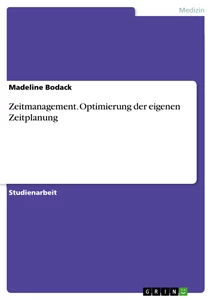First things first:
- Create a schedule and break the writing process into realistic steps.
- Even during a writing marathon, taking breaks is essential.
- Connect with other students who are also feeling the pressure of deadlines.
Every student has been in this situation: whether it’s the overwhelming exam period that leaves little time for term papers toward the end of the semester, or simply forgetting a deadline. Are you currently facing a term paper with a due date fast approaching? If so, we’ve got the right tips for you.
Proper Organization and Preparation
Your first thought might be: “How important is this term paper?”—and that’s not a bad question to ask. Consider whether the topic is manageable given the time left or if the research demands are simply too high. Ask yourself how important this paper is within the scope of your entire studies; if it carries significant weight, it might be smarter to complete it next semester when you have less pressure. Once you’ve evaluated these factors and decided to tackle the paper now, take a deep breath. Start by creating a detailed plan of action and block out specific times to work on it. Avoid scheduling meet-ups with friends during this period, and dedicate these days entirely to your term paper.
When creating your schedule, make sure to reserve the last day before submission for final touches, such as completing the bibliography, creating the table of contents, and proofreading. Allocate at least one additional day for research. If time is tight, prioritize online research as much as possible. Check out our magazine article where we share three easy tips for mastering online research. The next step in your plan is to divide the writing process into manageable chunks. For example, if you have seven days to write a 15-page paper, this leaves you five days for writing the main content. While this might sound like very little time, it actually breaks down to just three pages per day—much more achievable when framed this way.
Keep your instructor’s guidelines handy, particularly for formatting requirements. By adhering to these from the beginning, you can save yourself a lot of extra work as the deadline approaches.
A solid schedule isn’t the only key to success—proper nutrition is also essential for effective preparation. Stock up on plenty of snacks and drinks, but don’t forget to plan for daily warm meals. To save time, look up quick and easy recipes online so you won’t need to interrupt your work for grocery shopping or meal prep.
Start Writing
Now that your preparation is complete—your schedule is set, the task feels more manageable, and you’ve taken care of your meals—it’s time to start writing!
Especially when time is running out, it’s best to just start writing. You don’t need to begin with the introduction or the first chapter. Instead, start with the section that feels easiest to write or the one for which you’ve already gathered plenty of sources during your research.
If you’re struggling with writer’s block during this stressful time, check out our magazine article for tips on how to overcome it. The introduction and conclusion are often the most time-consuming parts, so consider writing them last. You’ll find it much easier to craft them once the main body of your paper is complete, as you’ll already have all the key points in place.
Don’t forget to take regular breaks during the writing process. Under pressure, it’s easy to skip them to save time, but this will only harm your focus and reduce the quality of your work. You have the flexibility to schedule your time, so make use of your most productive hours. If you’re more focused in the afternoon than in the morning, adjust your schedule accordingly.
Consider structuring your work and break times with methods like the Animedoro technique, which involves writing for 40–60 minutes followed by a 20-minute break. To ease back into your writing flow after a break, start by reviewing your formatting and citations. When citing sources, whether in-text or as footnotes, it’s better to do it immediately as you use them rather than leaving it for the end. Citations are a critical part of your paper and play a significant role in its evaluation. Take a moment to refresh your knowledge of proper citation formats if needed.
You might also be interested in these articles:
Proofread and Submit
You’ve done it! Your term paper is complete, and you’ve managed to stick to your schedule, leaving a buffer before the deadline. Use this extra time to have someone proofread your work. Reach out to friends in advance and ask if they can help. After the writing marathon of the past few days, you’ve likely become “blind” to your own text, making it harder to spot typos or minor mistakes.
Someone reading your paper for the first time will easily catch small errors and might even offer helpful suggestions to refine your phrasing. Since the proofreading window will likely be tight, consider offering a small gesture of thanks—like treating them to a coffee outing to celebrate submitting your paper!
Finally, double-check the submission requirements for your term paper. In many cases, an electronic submission is sufficient, but sometimes you’ll need to submit a printed copy at the university. Don’t forget to account for this in your buffer time to ensure a smooth submission process.
Congratulations — you’ve made it! After several intense days of writing, you’ve accomplished something great. The relief is immense, but do you want to avoid going through such a stressful time again? Consider using the time management strategies you’ve just practiced to plan your entire semester and exam period. This way, you’ll never miss a deadline again.
Bonus tip: The long nights of procrastinated term papers
Many universities in Germany now offer a “Long Night of Procrastinated Term Papers” at the end of each semester. These events bring students together to focus on their term papers in a supportive environment, with instructors or tutors available to provide guidance. Check your university’s website to see if such an event is available and if you can participate. Having an outside perspective is especially valuable when you’re deeply immersed in writing and might lose sight of the bigger picture.
Here you’ll find additional tips to improve your planning, along with our complete guide to writing term papers:
Our recommendations:
Do you like our magazine? Then sign up for our GRIN newsletter now!












